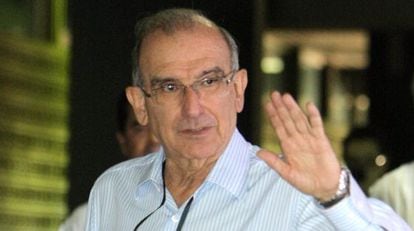Colombia negotiator: “If a deal is reached, FARC will not keep its guns”
President Santos begins European tour to drum up support for post-conflict era

The Colombian government’s chief negotiator at the peace talks with the FARC said on Sunday that once the definitive agreement was signed, the guerrilla group would have to start turning in its weapons.
“Colombians can rest assured that the FARC will not keep its weapons if a deal is reached,” said Humberto de la Calle, speaking from the Cuban capital, Havana, where negotiations have been taking place for two years. “Putting the weapons down is an imperative to ensure there is no armed peace.”
The government delegate also talked about the 11 victims of the armed conflict who were flown to Havana to meet personally with the negotiators on Sunday.
“These visits remind us why we are working on this dialogue: precisely so there will be no more victims, and that we may respect their rights fully.”
This is the fourth group of victims to fly to Havana to meet the negotiators, although instead of the usual 12 people there were only 11 this time, as Tulio Murillo, an imprisoned former FARC fighter, had refused to join.
Members of the victim delegation included a former paramilitary fighter who was recruited while still under age, and a female journalist who was sexually abused by paramilitary forces. In total, 60 victims of the guerrillas, the paramilitary groups and state agents are due to speak out about their pain and about their expectations for truth, justice and reparation.
This week, FARC leaders publicly admitted that they had harmed Colombians during the 50-year history of the armed conflict, and said they would take responsibility for their acts of war. They also said they never targeted civilians specifically.

To De la Calle, this is an important step by a group that had repeatedly refused to acknowledge their victims, but it is not enough.
“The ‘you’re guilty too’ excuse has a place in our analysis, but it must not be used by any of the actors to reduce the weight of their acknowledgment of responsibility over serious crimes,” he said.
De la Calle’s statements come a few hours after President Juan Manuel Santos began a tour of six European cities in search of political and financial support for the post-conflict era. His first stop was Madrid, where he met Spanish Prime Minister Mariano Rajoy and King Felipe VI. Later he will visit Brussels, Berlin, London, Lisbon and Paris.










































